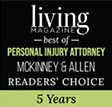Navigating a Personal Injury Claim Following a Car Crash
Anyone who has experienced the unfortunate event of being involved in a car wreck knows firsthand just how stressful the aftermath can be. Regardless of who caused the collision, or how minor or major the damage, navigating the insurance claim process, tending to any injuries, and dealing with vehicle damage can be downright overwhelming.
Who Is at Fault?
Following an auto accident, many questions arise as you begin the process of assessing the damage, exchanging insurance information, filing a claim, and reporting injuries. One of the first concerns is typically who will pay for repairs and any medical bills that are incurred. While your insurance company or your insurance agent might be capable of explaining your policy, it will do very little good if you do not understand your rights or what that policy means in the first place. It is important to determine who is at fault and who is responsible for what expenses.
Although auto insurance policies vary greatly in terms of coverage, Texas has certain laws that stand across the board, regardless of what insurance carrier you work with and what coverage you have. For example, the “comparative negligence” law in Texas states that more than one person can be considered at fault for a car accident. If you are fifty percent or less at fault for the accident, you are eligible to collect damages. In general, each driver's insurance company will investigate the claims in an effort to determine which driver or drivers should be held responsible for any injuries or damages.
Available Damages
If there were no injuries caused by the accident, the insurance companies for the responsible party or parties are likely to offer settlements (often times poor offers) for damage to your vehicle. If you or someone in your vehicle was hurt, however, the situation changes dramatically. Generally, insurance companies do not make settlement offers until your medical treatment is concluded. Because Texas has various statutes of limitations for bringing claims, we have seen time and again where insurance companies string victims along until the statute of limitations has run and victims can no longer recover. When offers are made, they are generally very poor when victims are not represented by legal counsel. Some studies show victims who are represented by legal counsel receive more than 7 times the amount of those who do not have attorneys helping them.
The bottom line is that you should seek medical attention immediately if you have suffered injuries. Follow your medical providers' advice and treat diligently, or else the insurance companies will claim an affirmative defense alleging you failed to mitigate your damages. A qualified personal injury attorney can help you not only collect money to pay medical bills, but also recover compensation for lost wages, pain, physical impairment, disfigurement, loss of consortium and many other types of damages.
With this in mind, it is important that you do not agree to accept early, poor settlement offers before having a full understanding of the entire situation — including your prognosis for making a full physical recovery, not to mention rights that others have to your settlement, such as alleged subrogation interests and liens, which a qualified personal injury attorney can reduce or even eliminate for you. You should also keep comprehensive records of anything that you have paid out of your own pocket related to the accident. All of these expenses should be reimbursed as part of your personal injury claim.
A Texas Injury Lawyer Can Help
Thankfully, Texas drivers are required by law to carry bodily injury and property damage liability insurance to cover any damages they might cause in an auto accident. Should you be involved in an accident, a knowledgeable McKinney car accident attorney can help you understand your rights. Call 214-726-0016 for a free consultation at Burress Injury Law today.
Source:
Civil Practice and Remedies Code


















 ON
ON
